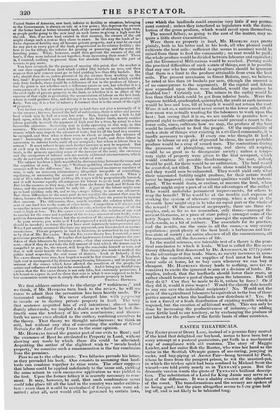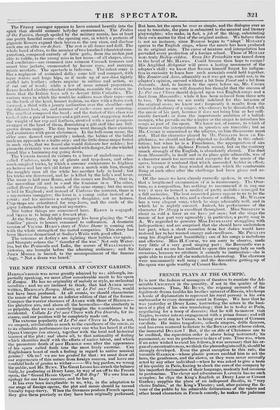EASTElt TIIEATRICALS.
Tats Easter piece at Drury Lane, instead of a genuine fairy marvel of the kind that delighted our boyhood, seems to have been but a sorry attempt at a pastoral pantomime, put forth in a mechanical way of compliance with old customs. Time story of Maggie Lauder, and her suitor Rob the Ranter, who wins her hand as the victor in the Scottish Olympic games of ass-racing, jumping in sacks, and bag-piping at Amster Fair—being favoured by Puck, whom he frees from the pungent prison, to wit the mustard-pot, in which the tricksy spirit had been confined by Michael Scott the wizard—are told pretty nearly as in TENNANT'S poem. But the dramatic version wants the gusto of TENNANTS brilliant descrip- tion. The substitution of a Laird for King Jamie may serve as a hint of the difference. It was a shabby evasion of the splendour of the court. The transformations and the scenery are spoken of as being good ; but the piece altogether seems to lave gone bait lug off, and is not likely to be tolerated long. • Tats Easter piece at Drury Lane, instead of a genuine fairy marvel of the kind that delighted our boyhood, seems to have been but a sorry attempt at a pastoral pantomime, put forth in a mechanical way of compliance with old customs. Time story of Maggie Lauder, and her suitor Rob the Ranter, who wins her hand as the victor in the Scottish Olympic games of ass-racing, jumping in sacks, and bag-piping at Amster Fair—being favoured by Puck, whom he frees from the pungent prison, to wit the mustard-pot, in which the tricksy spirit had been confined by Michael Scott the wizard—are told pretty nearly as in TENNANT'S poem. But the dramatic version wants the gusto of TENNANTS brilliant descrip- tion. The substitution of a Laird for King Jamie may serve as a hint of the difference. It was a shabby evasion of the splendour of the court. The transformations and the scenery are spoken of as being good ; but the piece altogether seems to lave gone bait lug off, and is not likely to be tolerated long. • The Fitzroy manager appears to have entered heartily into the .spirit that should animate holyday amusements. The Frolics of the Fairies, though spoiled by the military mania, has at least one pretty fanciful scene—the opening one, in which a parterre of gigantic flowers expand their leaves as the sun rises, and disclose each one an elfin cor deliori. The rest is all dance and drill. The whole band of elves, to the number of two hundred (theatrical com- putation), composed entirely of little girls, from the urchin just able to toddle, to the young miss in her teens—of all shapes, sizes, and conditions—are crammed into crimson Cossack trousers and smart blue jackets, surmounted by hussar caps, and carrying mimic muskets. The spectacle is ludicrous. The infant army is like a regiment of animated dolls ; some tall and compact, with taper waists and huge hips, as if made up of saw-dust tightly stuffed into leather ; others angular in outline and action, as if cut out of wood; while a few of more rotund proportions, flaxen-headed chubby-checked cherubim, resemble the waxen in- fants that the Italian boys sell to devout little Catholics. The various ways in which the would-be soldiers wore their caps—one on the back of the head, bonnet fashion, another with a tierce cock fin.waid, a third with a jaunty inclination over the shoulder—and the different look, air, and manner of each—were most amusing. The smallest composed the band ; and the tiniest of this class was tucks(' into a pair of trousers and a gilt coat, and staggering under the weight of her cap and feathers, strutted with a most pompous swagger at the head of them, flourishing a gilt staff like any full- grown drum-major. The tiny troops went through their exercise and evolutions with great cleverness. In the ball-room scene, the elder ones danced very prettily ; indeed, the babies of the ballet made an approach to a waltz-step ; and the little drum-major footed in such style, that we feared she would dislocate her ankles; her pirouette certainly was not unattended with danger, for she whirled round like a humming-top going down. The Victoria treated its visiters to a brace of melodramas ; one called Umbroso, made up of ghosts and trap-doors, and other mock-magical tricks, by which a sorcerer endeavours to frighten an heiress and her rich old father into a match with him, though the naughty man all the while has another lady in hand : but his tricks are discovered, and he is killed by the lady's real lover. The scene is laid near Rome, and the names are Italian ; that is, the masculine all end in o and the feminine in a. The other, called Brown Fanny, is much of the same stamp; but the scene is laid in England ; and instead of Umbroso the sorcerer, there is a mysterious smuggler; the lover is a young sailor instead of a count ; and his mistress a cottager's daughter, not an heiress. Clap-traps arc substituted for trap-doors, and the cards of the gipsy fortune-teller for magical mysteries. But better things are announced here. ELTON is engaged; and SERLE is to bring out a five-act play. At the Surry, the Adelphi company has been playing the "old familiar" pieces to houses crammed to suffocation. A dramatic version of VICTOR HUGO'S story of Notre Dame is coming out, with the whole strength of the united companies. This story has been likewise dramatized at Sadler's Wells with good effect.
The veterans at Astley's are lighting their battles o'er again ; and Stangate echoes the " thunder of the war." Not only Water- loo, but the Peninsula and India, the scenes of WaLLINGTox's victories, are brought before the admiring audience; and Sir JOHN MOORE is buried, to the accompaniment of the famous elegy, " Not a drum was heard."

















 Previous page
Previous page